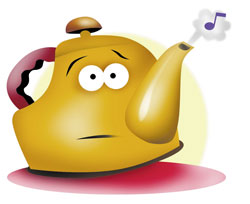俗话说:响水不开,开水不响。烧水的时候,水加热到一定的程度,就会在茶壶里“吹口哨”,而水烧开后,声音就消失了。下面这篇文章就来为您解开这个谜团。
 If you have ever peeked inside a kettle as it boils you might have noticed tiny bubbles appearing on the element and rising to the surface. These bubbles are caused because the heating element is causing the film of water surrounding it to reach the boiling point and turn into steam. Because steam is a gas and is less dense than water it will rise to the top of the kettle.
If you have ever peeked inside a kettle as it boils you might have noticed tiny bubbles appearing on the element and rising to the surface. These bubbles are caused because the heating element is causing the film of water surrounding it to reach the boiling point and turn into steam. Because steam is a gas and is less dense than water it will rise to the top of the kettle.
Time for some quick revision in case anyone is wondering:Densityis a measurement of the amount of space a certain amount of matter occupies. So if you were to measure the space taken up by a certain amount of liquid water and then turn it all into steam and see how much space the gas takes up, you would see that the steam takes up more room and is therefore less dense. OK, enough of that.
OK, back to the kettle. So our bubbles of gaseous water (steam) are currently rising towards the surface of the water because of their lower density. But because the water is further away from the heating element is no where near boiling temperature (because they are further away from the element), the bubbles of steam get cooled down and return to liquid form. The process of the lower-density bubbles of gas suddenly becoming higher-density water again is what makes the noise. If you think about it, the liquid water takes up less room than it did when it was a bubble of gas as it is denser. So as it changes its state, water molecules surrounding the bubble will rush in to fill up the space that it used to occupy when it was less dense and took up a larger space. This is only on a very small scale but it is still very noisy. As the water gets heated more and more, the bubbles of gas get bigger and as they burst before they reach the surface, it makes more and more noise.
Then suddenly, all will go calm and there will be no noise. This calm before the steam (ha ha) is because all the water has finally reached boiling temperature and the bubbles of gas can reach the surface of the liquid and escape into the air. This doesn't make as much noise as when all the bubbles were bursting. Of course, when all of the water starts boiling it gets noisy again as it is all being churned about as it happily bubbles away.
Now, if you reboil water that has already been boiled or had been left standing it should in theory make less noise. For a bubble of gas to form it takes a bit of effort. Think of all that water that has to be pushed out of the way. Once a bubble managed to form, it gets easy for other water molecules to get in on the act and turn into gas too. Water from the tap already has dissolved gas in it that can be used to seed bubbles. But if its already been boiled, a lot of the dissolved gas has gone. Less bubbles=less noise.
This brings me on to what can happen in a microwave. You heat up some water and it doesn't look like it's boiling, then the second you touch it, the whole thing explodes out of the mug and burns you. This is due to superheating. This is the process of heating something above its boiling temperature without it actually boiling. Water boils at 100 °C if there is already a bubble of steam (or air) present. But in the absence of bubbles, water can be heated above 100 °C.
A mug has very smooth sides (unlike a kettle or saucepan) so there is nowhere for little bubbles of air to get trapped and act as bubble seeds. Plus, the mug is cooler than the water inside, unlike when you heat water in a saucepan or kettle where the metal and heating elements gets hotter than the water. This means that you'll get small areas of superheating in a kettle of saucepan but the whole thing gets superheated in the microwave. All of this means the water in a mug being heated in a microwave is much more likely to superheat than in a kettle. Then when you disturb the water, the mixing leads to it all boiling really rapidly as it is so hot. WARNING: This is dangerous! Please don't try it at home!
density: 密度
(北京外国语大学通讯员谢丽供稿 英语点津 Annabel 编辑)